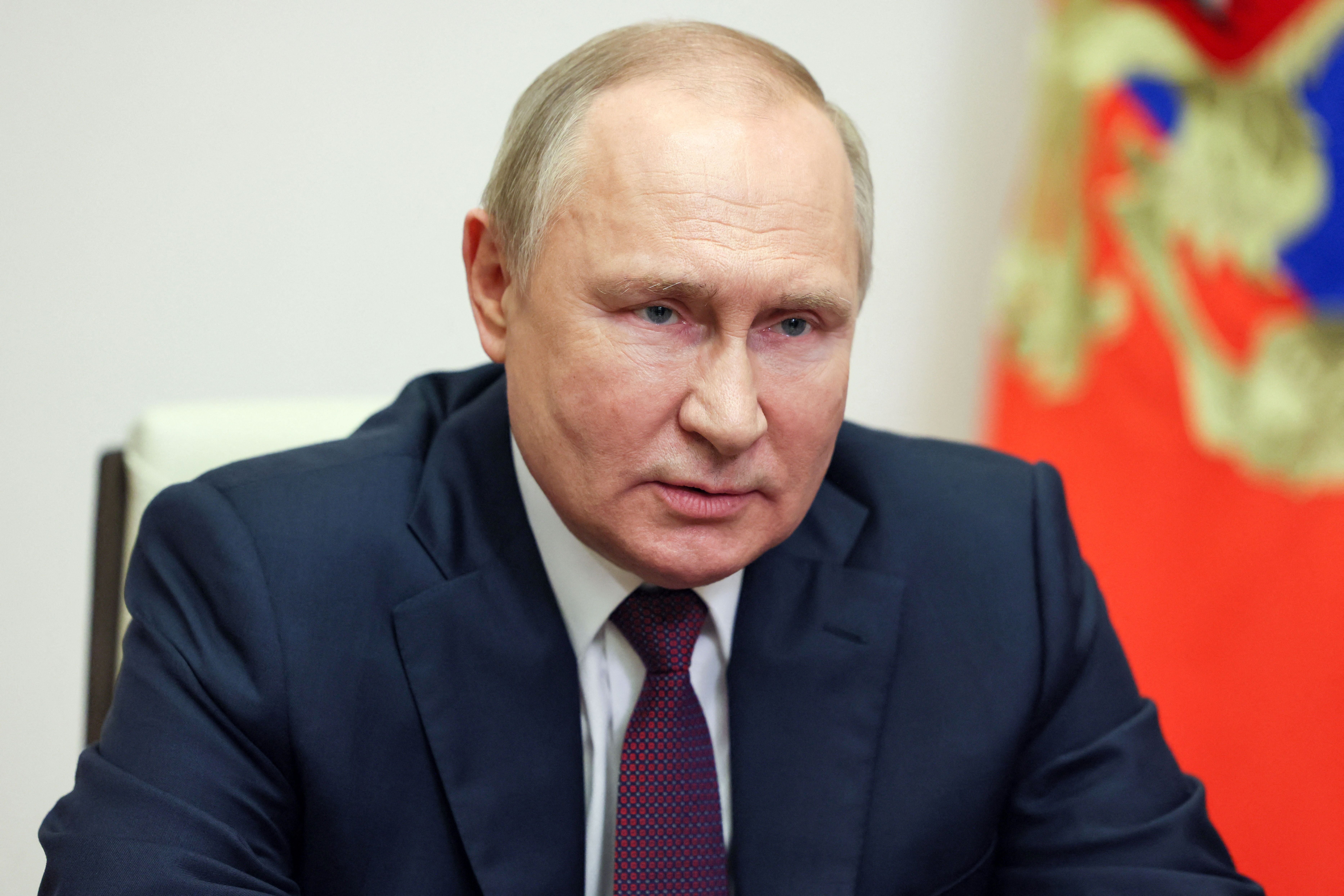I know what Putin’s grand plan is – and why it is doomed to fail
Putin did not take a number of objective factors into account when planning the conquest of Ukraine, writes Natalia Yakovenko


Putin’s policy in the post-Soviet space is based on an obsession with the idea of restoring the empire in one form or another – of reviving the former greatness of Russia.
In his political behaviour, one can trace the features of traditional totalitarian dictators of different times, nostalgic for the lost lands. It should be borne in mind that Putin is a former KGB officer, and the KGB of the USSR had always stood guard over the security of the Soviet elite and the integrity of the state.
The integrity of the state had failed.
We can say that the current president of Russia wants to go down in history as the restorer of Russia, reimagining the Russian Empire and the USSR. With the collapse of the Soviet Union, Ukraine became the most significant casualty for Putin in breaking away from the USSR.
It was Ukraine that became the stumbling block; it was Ukraine that, according to Putin, had to be united with Russia in the first place, and it was from this foundation that Russia’s greatness had to be revived.
It was because of this imperial idea that the war began.
It would be a mistake to consider that Putin started the war against Ukraine on 24 February 2022. Russian troops entered Ukraine as far back as in February 2014. They captured Crimea and turned it into what is today a large military base. They made the Black Sea and the Sea of Azov two of the most dangerous seas on the planet. They started a terrible, absolutely cynical war in Donbas and they have been killing Ukrainians for the past eight years. According to the UN, this conflict has taken more than 13,000 lives.
The modern-day attacks have thus been planned by Putin for a long time. He methodically moved more than 150,000 troops and tonnes of military equipment to Ukraine’s border. He built field hospitals, in doing so demonstrating his intentions all along. Russia has denied that it was preparing for an invasion and instead claimed that Western countries undermined its security through NATO’s expansion toward its borders.
Nevertheless, the contemporary stage of the war in its present form could easily have been avoided. Even those problems that have existed between the two countries since 2014 (for example, concerning Crimea and Donbas) could have been completely resolved without destructive hostilities of such a scale.
Unfortunately, many people all over the world seem to be getting used to this war, at least in an informational way.
Putin’s current policy, his war against Ukraine, is doomed to defeat. This inevitable strategic failure is predetermined by a number of objective factors that Putin did not take into account when planning the conquest of Ukraine. The information that he was guided by was long outdated, false and will let the Russian president down.
First of all, Putin did not expect Ukraine to resist so fiercely and cohesively. On the contrary, he expected Russian occupation to take place in quick and bloodless fashion, similar to that which happened, in his view, in 2014 in Crimea.
However, Putin’s blitzkrieg failed. The point is that Ukraine has changed in the course of eight years, after its ”revolution of dignity” and before the beginning of Russian occupation.
The Ukrainian people were traditionally (and, as practice shows, erroneously) perceived by many not as a single nation, but as a divided one, torn in different directions by geographical, historical, linguistic, ethnic and other factors. The war has erased these distinctions.
The Ukrainians of 2022 are consolidated.
The outstanding unity demonstrated by the Ukrainians during the defence of Mariupol, Kharkov, Bucha, Chernigov, Kramatorsk and other places turned them into heroes for the whole free world. Amid war and brutality, Ukrainians are transformed and united. More than three months of persistent defence has become an achievement for millions of Ukrainians. The people of Ukraine are resilient and will continue to defend their motherland to the end.
Second, transatlantic unity shocked Russia’s president. It is very important for Putin that no unity is forged by the West. Separation is extremely significant for him. However, the world has united and joined together in solidarity, coordinating intensively to engage as one with Ukraine, to provide any possible assistance to Ukraine and develop a broad and massive response. Thus, Putin’s goal of dividing the international community has failed as well.
Measures have been implemented to welcome Ukrainians who have fled the armed conflict and huge humanitarian aid programmes and mechanisms have been launched to reduce the suffering of the displaced. The European Union and its member states have provided protection to millions of refugees fleeing the war in Ukraine and remain committed to welcoming and providing safety to them.
To keep up to speed with all the latest opinions and comment sign up to our free weekly Voices Dispatches newsletter by clicking here
The EU is in fact prepared to play a major role in rebuilding Ukraine for the future.
Military assistance has been also provided to Ukraine from across the globe. The United States, as well as more than 40 allies and partner countries, are working around the clock to expedite shipments of arms and equipment, essential to Ukraine’s defence. The Czech Republic and Poland are sending additional weapons to Ukraine as it struggles against a renewed Russian offensive in the eastern parts of the country. US president Joe Biden signed into law the Ukraine Democracy Defence Lend-Lease Act of 2022, authorising the administration, through fiscal year 2023, to lend or lease military equipment to Ukraine and other eastern European countries.
At the same time the West is taking action to hold Russia accountable. As a result of unprecedented global sanctions coordination, Canada, the US, the United Kingdom, the EU and Japan have removed selected Russian banks from the Swift messaging system and imposed restrictive measures on the Russian central bank. The British government announced the implementation of new sanctions against Russian banks and wealthy individuals. After Putin began his invasion, the rouble hit its weakest point in history and the Russian stock market plunged. Severe sanctions have been imposed on the architects of this war, including Putin himself.
In its latest attempt to punish Russia for the invasion of Ukraine, the EU is to ban all imports of oil from Russia that are brought in by sea. Along with countries such as the UK and the US, it has introduced a series of measures to weaken key areas of the Russian economy, including its energy and financial sectors.
Putin still radiates confidence that all is well, is still in captivity of his own illusions about what Ukraine is. Russia continues to justify its military aggression by falsely claiming the need to stop “genocide” in Ukraine, despite there being no evidence that genocide is occurring.
Alexander Lukashenko, the president of Belarus, envisions his country as the only ally of Russia, a position he is very much afraid of losing. Lukashenko sees that Putin is losing the war, that power is drifting away. The Belarusian president will never be able to return to the previous model of relations with the West. That is why Putin will continue to support the Lukashenko regime in the post-war period.
But Putin’s days are numbered, and it is not known whether a post-war period will ever come for the Russian president.





